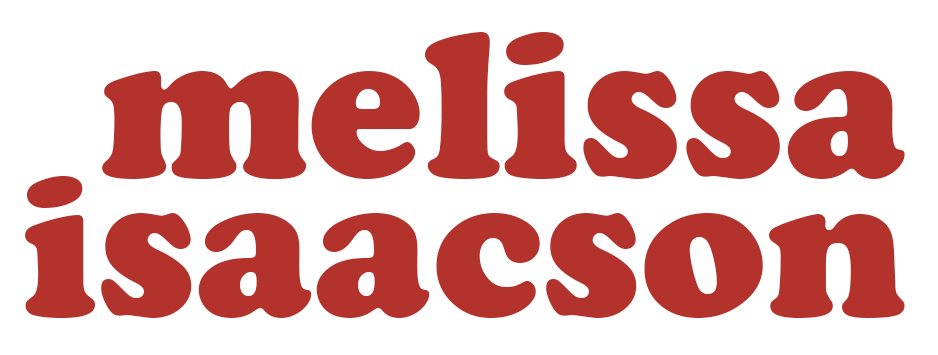-
When your baby grows up
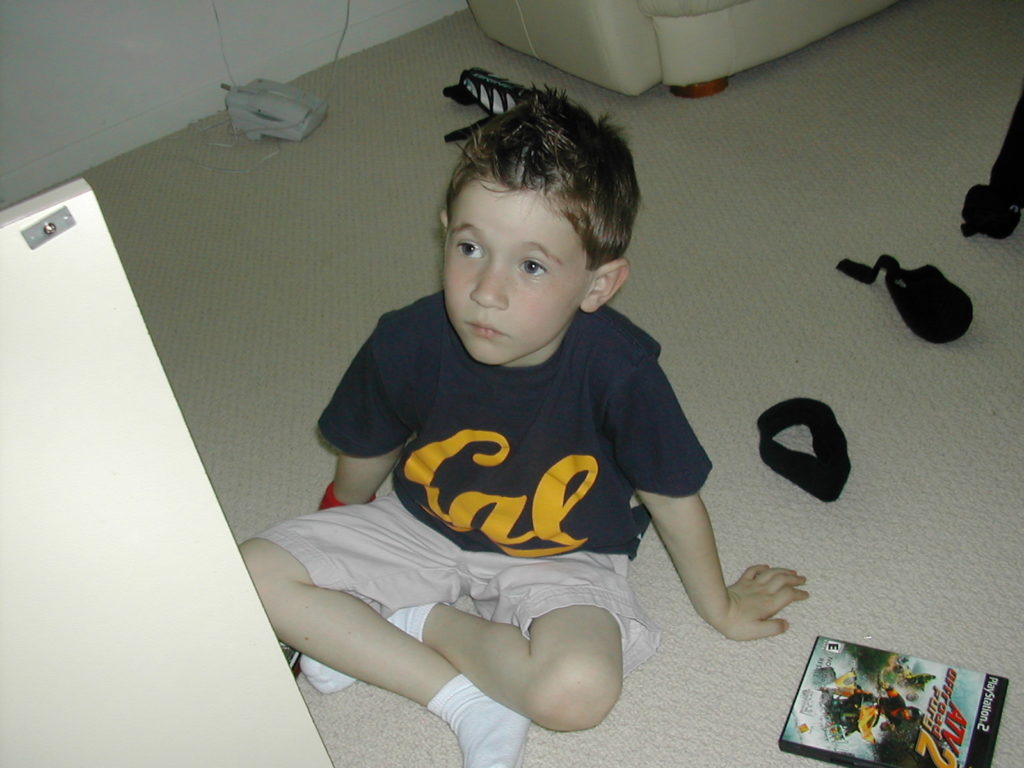
My baby is 21 years old today. Excuse me while I let that sink in for a second. Alec is old enough to be considered an adult in every way except the rental car place. He can gamble in most states. Apply for a marriage license in Mississippi without parental consent. Adopt a child in the UK. Legally buy an ounce of marijuana in Colorado. Oh, and today he can finally drink alcohol. I have to remember to tell him.
More importantly, I am old enough to be the mother of now two grown-ups.
Kids have no idea that when they have birthdays, parents do too. It’s the anniversary of one of the most momentous occasions in our lives (unless you count winning a state championship, which I recently made the mistake of calling the highlight of my life in an interview and was immediately called out by my ever-vigilant daughter Amanda. “Really?” she said calmly. “So childbirth not so much, huh?”)
But on every birthday, and especially the biggies, mothers like me flash back to that childbirth, pausing just long enough to yell at our husband for taking a shower during advanced labor; picture our son’s cute, innocent little face before he decided shaving can be a nuisance; and recall once again that time in kindergarten orientation when he was asked to introduce himself and, following the teacher’s turn, announced, “Hello, my name is Mrs. Singer.”
Of course, the “r” in Mrs. Singer was pronounced like a “w,” so it was extra cute, which is always part of the oral recitation of the story.
The concept of this little boy now planning his life as an adult is staggering. But for anyone who has ever had a 21-year-old, it includes the knowledge that “adult” is a relative term, and that our interference/rights as parents will still occasionally be employed and maybe, if we’re lucky, even requested.
This is strange territory and in no way do I profess to have a single shred of insight, despite the presence of Amanda, who will be 24 this summer. While we do not want our kids to be living in our basements at 30, I am not afraid to say that the possibility of one or both living out-of-state one day makes me weepy, and makes my husband actually weep.
And so I pause on this occasion and can only hope what most parents do, that we did our jobs. That this boy who is now allowed to get married on his own in Mississippi, is prepared to take his place as a good citizen and one day, if he so chooses, as a great husband and a stupendous parent.
What I know is that there are some things where we just got lucky. We could not have dreamt that Alec would be as smart and passionate and kind as he is. Or that following his lead would work for us nearly without exception.
If it is now time to let go in some symbolic way, I am not ready. But I am proud. And filled with as much love as I was after Rick took a shower and drove too slowly to the hospital.
Happy Birthday, Alec.
-
Thank you, Senator
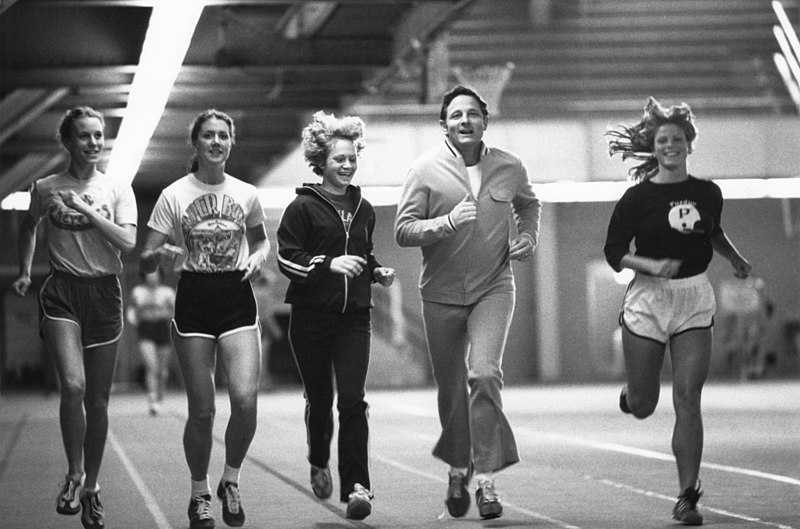
He answered his own phone, which threw me when I realized it was really him. But there was little pretense about Birch Bayh, who died today at 91.
I had called to interview him for my book. It was 2005 and the U.S. Senator from Indiana and one-time Democratic nominee for President had no warning that I would call, no staff to hold me off or even make an appointment. He was 77 years old and he said he would be happy to speak to me.
I wanted to know how he became the author of Title IX, which became law in 1972. I knew he wanted to give women equal opportunities in public education. What I did not know was the inspiration two women, in particular, had in his life and on his belief system.
He told me that he was 12 when he went to live on his grandparents' farm northwest of Terre Haute, Indiana, after his mother Leah died and his father went to China with the Army Air Force just before World War II. His maternal grandmother Kate Hollingsworth had been a school marm and he said one of the biggest influences in his life was observing her.
"It never entered my mind that women aren't as important as men because I could see my grandmother working long after my granddad was on the front porch, smoking his pipe," Bayh said.
"I don't think Granddad made a single decision of consequence that Kate didn't have a voice in it. But what I didn't know was that my grandmother could not have inherited that farm. Once I got a little older and understood what was going on, I insisted they re-write their will and put it under joint ownership. But at the time, all those things were going on that I was not aware of."
As a boy, Bayh's father Birch Sr., coached four sports at Indiana State and was also the director of physical education for the Washington D.C. public school system.
"In the mid 30s," Bayh recalled, "I remember us all gathering around the breakfast table and Dad telling us he was going to testify before Congress. I said, 'What are you going to say to them, Dad?' And he told me, 'There's going to be a day when we need to appropriate money for girls' physical education and if they ask why, I'm going to say that little girls need strong bodies to carry strong minds around in, just like little boys do.'
“It had to be subliminal, but I do remember that."
The former Senator told me about his first wife Marvella, and that they were “just two kids when we met at 19. It was love at first sight and I went home and told my family I found the person I wanted to marry.”
Marvella was a straight-A student in high school, the first girl to be elected class president and later a national speech champion, defeating her future husband in the competition. But in 1951, she was denied admission to the University of Virginia, where it would be nearly 20 years before state law allowed women in.
Eventually, she graduated from college and after a near fatal car accident that had her in a coma for almost a month, she completed law school as well, graduating on the same day as her husband.
When Bayh spoke of his career, he used the pronoun “we,” calling himself and Marvella “a tandem operation” and she would become his key policy adviser.
"She wasn't my wife," he said. "We were together as a team, fully equal."
Marvella died of cancer in April of 1979, less than a month after our high school girls’ basketball team won a state championship that did not exist just three years earlier.
Marvella was not a sports fan. When she went to the World Series with her husband and father-in-law, the Senator told me, she brought along the New York Times to read. "But what she said," he recalled, "is that we can't afford to ignore the development of 53 percent of the brainpower in this country. I had no idea how far that basic idea would take off."
I told him that he changed our lives.
"The first time Marvella and I ever met, over lunch, we each said we wanted to make a difference with our lives and that a career in government could do that,” he told me. “I think Title IX has done that and I'm proud to have been a part of it."
-
Championship drive
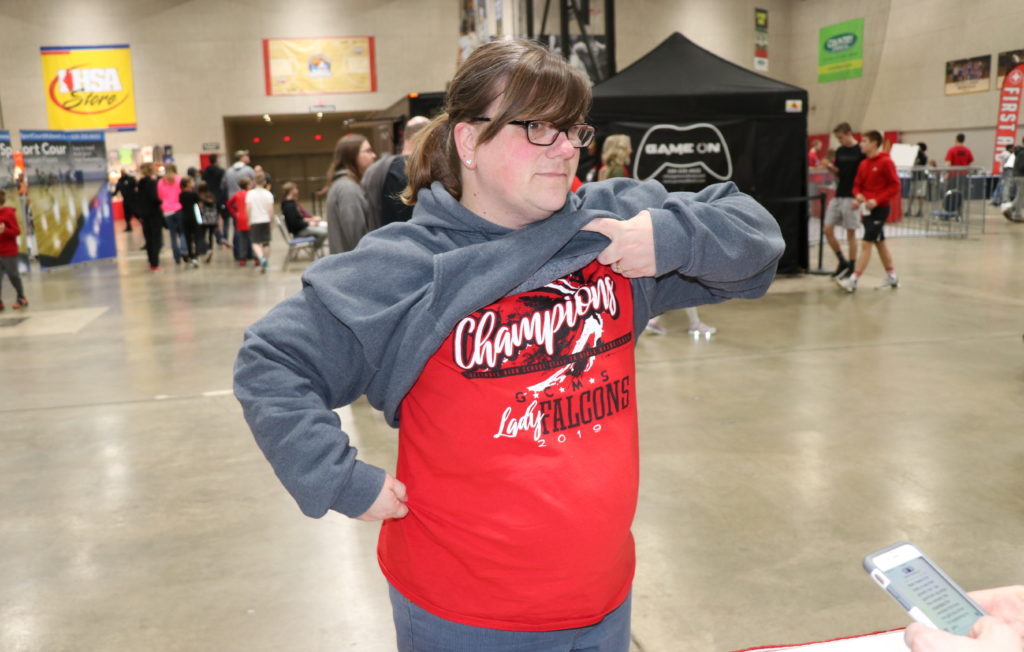
It’s a game I have been playing the last few weeks, sizing up men and women, kids in middle school and up, and trying to figure out if they are potential readers of my book.
But Kristina Meece snuck under my radar.
It wasn’t that she didn’t appear like she could enjoy a coming-of-age story about a group of kids whose lives were changed through our journey to a state basketball championship. As she approached our table Saturday in the Peoria Convention Center Exhibition Hall in her Gibson City-Melvin Sibley High School hoodie, she looked the part of any spectator mom.
But she was certainly not the stereotypical sports parent. She called her son Alex “a fourth-quarter warrior,” one of those kids (like me my senior year, who usually only came in once the game was already decided). And when she started tearing up, it had nothing to do with basketball.
She didn’t even identify herself as the parent of a player on the team until I asked.
Nope, the role Meece talked about is her job as team bus driver. Actually, the bus driver for several teams at the school of about 340 students, in a town of about 3,400.
“I had no clue about sports when I got married 25 years ago,” she laughed. “But from the first time you see them get on the bus and then to say our team made it to state, I love to see their growth until the end of the season. …”
She stopped to dab her eyes.
“I don’t say ‘Good luck,’” she said. “I tell them ‘Enjoy the moment.’”
I wondered what it was that really got her, and then she told me that she had first driven this same group of boys who would later Saturday finish third in the 2A state tournament, as a middle school team.
“They were so cute,” she said. “I just appreciate the honor they’ve given me to drive them.”
Meece talked about empowering the young women at her school as well, and flashed the GCMS girls’ basketball t-shirt she was wearing under her sweatshirt to show her devotion.
“I don’t think I can ever give up bus driving,” she said, “because to see these kids become men and women of integrity, well, I am just so grateful at the end of the season.”
It sounded like it would make a great book.
-
Just face it
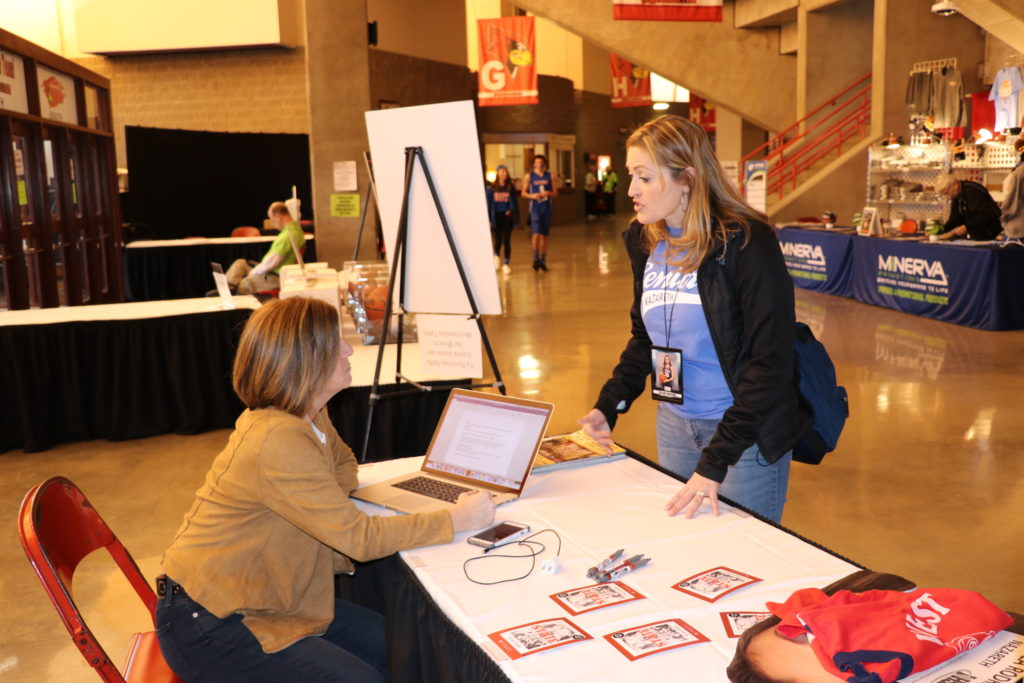
Under one arm was her daughter’s face, and around Jessie Rodriguez’ neck was a laminated picture of same daughter, the point guard on the Nazareth Academy basketball team.
The daughter’s face was approximately the size of the entire mom, one of those Fathead things that was apparently required of every mother of every girl at the Illinois state basketball tournament this weekend.
I tried to picture my mother carrying my giant face under her arm at our games a very long time ago and I can’t really do it. For one, the pictures of the faces are blown up to such an extreme, that in the case of your average teenager, every tiny blemish is roughly the size of a frisbee. Even a very long time ago, when we didn’t exercise much control over what our parents did or did not do, I don’t think we would have allowed our mothers to publicly display our facial pores magnified over 100 times their actual size.
But there I was, at Redbird Arena in Normal, Ill., with my husband Rick, watching moms carrying their daughter’s giant faces under their arms, because the Illinois High School Association was introducing my Niles West basketball team at halftime in celebration of the 40th anniversary of our state title.
I was also there to shamelessly plug my book (in case you missed it, it’s the same book that is the theme of my entire website), which entailed sitting at a table in the concourse of the arena with postcards that had the book’s likeness, a sign on an easel with the book’s likeness and very cool pens with the book’s likeness supplied by my friend Shari. Subtlety was not the theme.
I figured walk-up traffic was a given. Why? Because, Rick and I reasoned, whenever we go to Northbrook Days, our suburb’s annual carnival, we never pass up a freebie of any kind, including chip clips, plastic freezer ice scrapers and Rick’s favorite item, a junior police badge that I believe he knocked over several small children to obtain.
Parents of Illinois girls’ basketball state finalists are apparently much more sophisticated nowadays, for even when I nicely thrust the postcard into the hand of one woman who asked me what it was, she waved me off with a facial expression not unlike one you’d make if someone shoved unwanted wasabi into your mouth.
Undeterred, I eventually met Jessie Rodriguez, who, trying to kill time while waiting for her daughter Laila, and wanting to find a resting spot for her daughter’s giant face, stopped at my table.
She was totally charming, at 46 a mere child compared to my teammates and I, but telling me that even 40 years later, her daughter’s team still faced the same challenges/discrimination that we did.
“They’re still fighting the battle,” Jessie said. “No pep band, no cheerleaders, small crowds.”
But the most interesting thing Jessie told me was about her own experience in high school. Describing her two athletic and hyper-competitive daughters – Laila has a full scholarship to play basketball at Trinity Christian College, where she will also study nursing – I assumed Jessie was once an athlete or at least athletic.
“Nope,” she said shaking her head. “I’m Puerto Rican, and my mother would say, “You need to learn to cook and clean, so one day when you have a family, you’ll be ready.’”
“In the 80s, this happened?” I fairly screeched.
“Oh yeah,” Jessie said. “My mother said, “Let your brothers play sports.’”
I would have gone home completely depressed despite the whole 40th anniversary celebration thing, except that Jessie told me another story, this one with her now in college at Northern Illinois, slogging through computer science classes until one day, one of her male classmates told her something.
“This is not for you,” he said.
“Wait,” Jessie recalled saying, her eyes blazing at the mere memory of it in the concourse of the Redbird Arena. “What was that?”
“You shouldn’t be studying computer science,” he repeated. “It’s not for you.”
Jessie had already switched her major twice until she found computer science. And who was this guy to suggest she couldn’t do it. She knew exactly what he was getting at.
“I’ll see you at graduation,” she told him.
And indeed, she saw him. She, in her honors regalia, he with the sheepish look on his face.
“Well, now I know,” I said after she described her successful computer science career.
“What?” she said.
“Where your daughters got their competitiveness,” I told her.
She looked at me as if it never dawned on her that she would have passed down something that made her children successful athletes despite the fact that she never wore a uniform.
Then she smiled.
And my work was done.
-
I’m back!
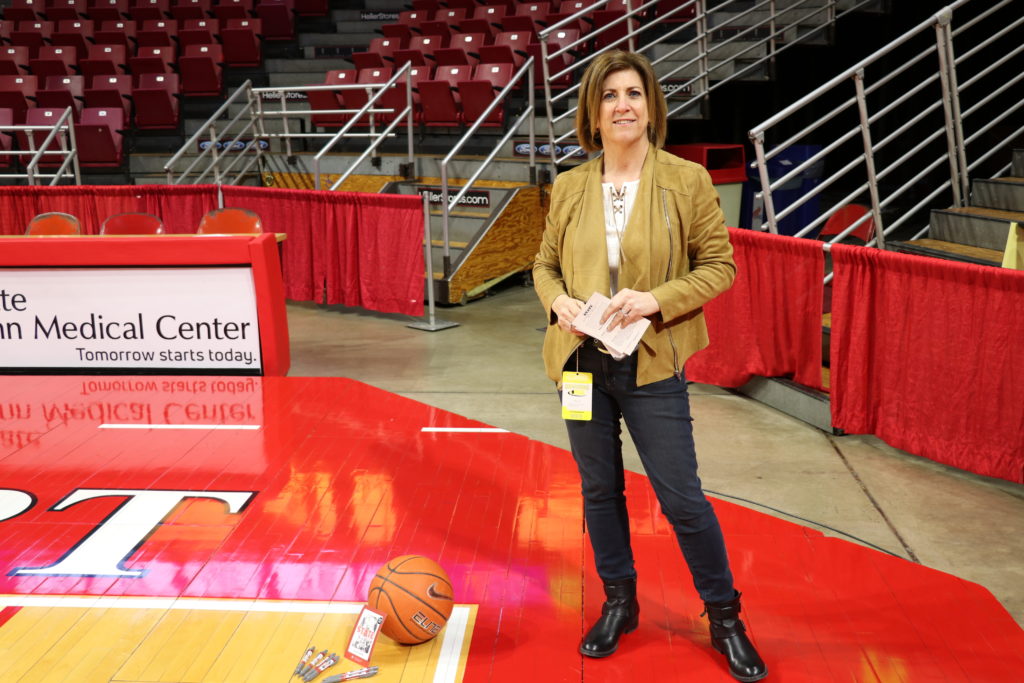
Why, you ask, has it been nearly eight years since I last wrote a blog on my website?
Same reason it’s nearly impossible to find Kemp’s Java Chunk at my Mariano’s. There is no earthly explanation. At least not a good one. Because it was pure joy. Not the Java Chunk -- though honestly it really is special, trust me, you should try it if you can find it, which you probably can’t -- but my blog, which I began in the wee hours of the morning after getting laid off by the Chicago Tribune in the spring of 2009, and sustained me in every way writing always has.
I wrote about everything and nothing. Finding a Sonics Drive-In and their special milkshakes (sensing a theme here?), Twinkies, the Duggars and my YMCA. Disregarding proper grammar became addictive. So too did a certain departure from journalistic integrity or at least dignity. My kids, who appeared semi-regularly in these blogs and often claimed to be misquoted, certainly provided plenty of fodder. Now of legal age, I won’t say it doesn’t scare me that they could actually litigate, but I suspect they will still appear here.
I couldn’t do any of that as a sportswriter. And that was fine. Covering the Bulls in their championship glory days, the Bears in their, well, years between 1996 and 2006, writing about Olympic and college athletes, Little Leaguers and Hall of Famers, blessed me with a career I treasured. But as I shifted restlessly in those days after the Tribune and when I was first rescued by ESPN, I found the blog to be an unexpected refuge, always there for me to rant, be silly or wallow in self-pity. After getting laid off by ESPN in the spring of 2017, I think I was too numb to remember how much I loved my old friend.
I did, however, retreat to another abandoned literary project when I picked up a manuscript I had written in 2004 and had only periodically attended to since that time. Resuscitating the book that will appear in bookstores on Aug. 13, brings me back here. It made me re-design this website to something approximating current times and a site that will not embarrass my students or my kids. More than that, it has made me really happy.
Titled “State,” it is, simply put, a story of transformation. It chronicles a period in which my high school teammates and I went from pressing our proverbial noses against the doors of the “Boys’ Gym,” unable to practice or play there, to four years later when, playing before standing room-only crowds in that same gym, we won the 1979 Illinois girls’ basketball state championship.
I write in the book that the experience “saved us,” that it not only changed our lives then, but made us into the women we would become. It also placed me in a suspended bubble of high school nostalgia, writing to the background music of Styx and the Beach Boys and Barry Manilow (yeah, I know), reminiscing about Tab and the gym lockerroom, and demanding that my old teammates remember what they were thinking that time we jumped half-naked into the pool at East Leyden after our supersectional, 40 years ago.
I will say that it’s a very good thing I began my reporting “just” 25 years after our championship because the memories are considerably harder now to retrieve. The words don’t come as easily. And I won’t lie. I worry the same disease that robbed my parents of who they were, will sink its claws into me. It is what pushed me to get our story down, to leave for my kids and hopefully for those who will find in it the same inspiration that we did.
I love this book. And I love this blog. And I’ll try not to go away again.
